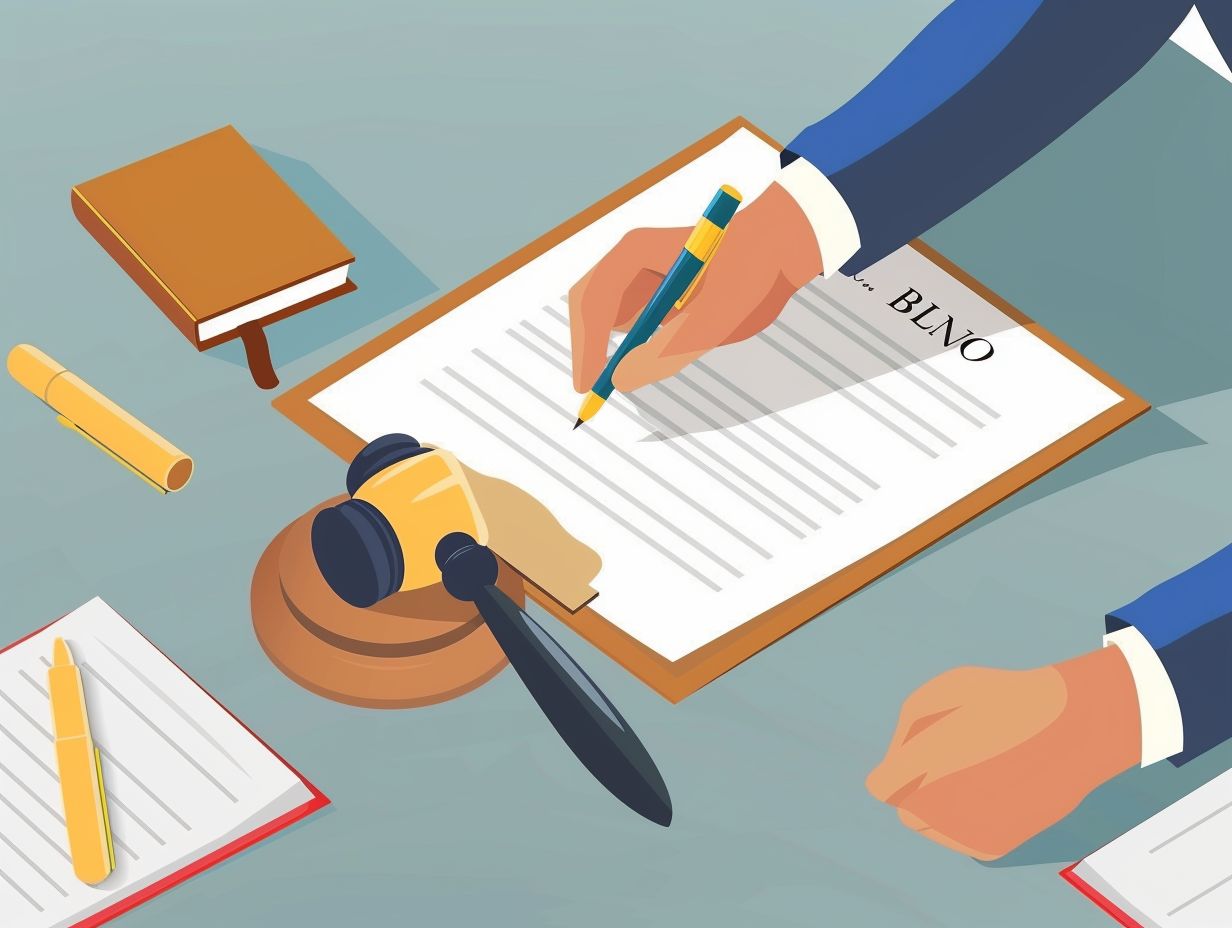Preparing for a real estate closing in Florida and feeling overwhelmed by the process?
This article will guide you through the essential steps involved, the necessary documents required, the costs you can expect, and how long the process typically takes.
Whether you’re a first-time homebuyer or a seasoned investor, understanding the ins and outs of a real estate closing will help ensure a smooth and successful transaction. Let’s dive in and learn everything you need to know to navigate the closing process with confidence.
Key Takeaways:

- Ensure a smooth real estate closing in Florida by understanding the 5 key steps involved, including contract negotiation, title search, home inspection, loan approval, and final walkthrough.
- Be prepared for a Florida real estate closing by having the necessary documents, including a purchase agreement, deed, title insurance policy, closing disclosure, and loan documents.
- Be aware of the costs associated with a Florida real estate closing, such as down payment, closing costs, and prepaid expenses, in order to plan and budget accordingly.
What Are the Steps Involved in a Real Estate Closing?
The process of a real estate closing in Florida consists of multiple stages that aid in the smooth transfer of property ownership from the seller to the buyer. This includes important tasks like negotiating the contract, conducting a title search, home inspection, loan approval, and completing all closing documents with the help of a real estate attorney and a title company.
1. Contract Negotiation and Signing
The first step in a real estate transaction is the negotiation and signing of the purchase contract between the buyer and the seller, which establishes the effective date of the agreement. This purchase contract is a crucial document as it outlines the terms and conditions under which the property will be transferred from the seller to the buyer.
Negotiating the contract involves discussing aspects such as the purchase price, financing arrangements, contingencies, and settlement date. The effective date, specified in the contract, marks the beginning of the timeline for the closing process. It is essential for both parties to understand and agree upon the terms of the purchase contract to ensure a smooth and successful real estate transaction.
2. Title Search and Examination
An essential aspect of the closing process involves a comprehensive title search carried out by a title company to verify that the property is clear of any liens or encumbrances.
This search is critical as it validates the legal standing of the property – whether the current owner has the authority to sell it without any outstanding debts or legal conflicts. By reviewing public records and property-related documents, the title search assists in identifying any potential issues that could cause complications in the future.
Detecting and addressing these problems in advance can help prevent expensive legal conflicts or ownership disputes in the future, offering assurance to both buyers and sellers.
3. Home Inspection and Appraisal
The home inspection and appraisal are essential steps in the real estate process. During a home inspection, inspectors carefully assess various aspects of the property, such as its structural integrity, electrical systems, plumbing, HVAC, and more, to identify any potential issues that may require attention or repair.
Conversely, an appraiser determines the property’s market value by analyzing it in comparison to similar homes in the area, taking into account factors like size, location, features, and recent sales data. Both processes are vital in the closing process, offering valuable information to both the buyer and the seller.
4. Loan Approval and Underwriting
Securing loan approval and completing the underwriting process with the lender is a critical step that involves verifying the buyer’s financial status and ensuring they meet all the necessary criteria.
During the underwriting process, the lender meticulously assesses various factors like the applicant’s credit score, income stability, debt-to-income ratio, and employment history to determine the level of risk involved in approving the loan.
This thorough evaluation helps the lender make an informed decision on whether to approve the loan. Once all the necessary information has been reviewed and the lender is satisfied that the borrower meets their lending requirements, final loan approval is granted, marking the successful completion of the loan approval process.
5. Closing Disclosure and Final Walkthrough
Before the closing date, the buyer is provided with a closing disclosure that outlines the final costs and conducts a final walkthrough to verify that the property’s condition aligns with the agreed terms.
The closing disclosure is an essential document that furnishes comprehensive information on all expenses associated with the real estate transaction, encompassing loan terms, closing fees, and any adjustments. It promotes transparency and aids the buyer in comprehending the financial components of the agreement.
Conversely, the final walkthrough is pivotal as it enables the buyer to physically examine the property one last time before officially assuming ownership. This process helps confirm that the property meets the expected condition, with any agreed-upon repairs completed and no unforeseen issues present.
What Documents Are Required for a Real Estate Closing?
In a real estate closing, various essential documents are necessary to ensure the transaction is legally binding and complete. These documents include:
- purchase agreement
- deed
- title insurance policy
- closing disclosure
- loan documents
1. Purchase Agreement
The purchase agreement is a legally binding contract between the buyer and the seller that outlines the terms of a real estate transaction. It plays a crucial role in the home buying process by specifying the purchase price, any contingencies that must be satisfied before the sale is finalized, and the deadlines for completing these requirements.
This agreement offers clarity and protection to both parties, ensuring that everyone understands and agrees to the terms of the sale. Price negotiation, inspection contingencies, and closing deadlines are all clearly articulated in the purchase agreement to prevent misunderstandings and disputes in the future.
2. Deed
The deed is a legal document that officially transfers ownership of the property from the seller to the buyer.
Deeds come in various types, each serving a unique purpose in real estate transactions. Some common types include warranty deeds, quitclaim deeds, and special warranty deeds. A warranty deed guarantees that the seller holds clear title to the property and has the right to sell it, providing the highest level of protection to the buyer.
Quitclaim deeds, on the other hand, transfer the seller’s interest in the property without making any guarantees about the title. Special warranty deeds only cover the period of time when the seller owned the property. Deeds play a crucial role in the closing process, ensuring a smooth transfer of ownership rights and protecting both parties involved.
3. Title Insurance Policy
Title insurance offers protection for both the buyer and lender in case of any future claims or disputes regarding the property’s ownership. This type of insurance is crucial in real estate transactions, as it covers any unexpected issues related to the property’s title.
To secure title insurance, a title search is carried out by the title company to confirm that the title is free from any outstanding liens or legal claims. Subsequently, the title company issues the insurance policy, serving as a neutral third party in the transaction. Should a dispute or claim arise concerning the title, the title company will provide legal defense and financial compensation according to the policy terms.
4. Closing Disclosure
The closing disclosure is a detailed statement given to the buyer before the closing date, laying out all closing costs and financial specifics of the transaction.
It is a crucial document that itemizes the final terms of the mortgage loan, covering aspects like the loan amount, interest rate, monthly payment amount, and any prepayment penalties or loan terms.
The closing disclosure provides information on all closing costs, such as appraisal fees, title insurance, property taxes, and other fees related to the closing process. This thorough breakdown enables the buyer to assess and comprehend all the financial elements of the transaction, ensuring transparency and clarity before the final signing.
5. Loan Documents
Loan documents are the paperwork that the buyer signs to finalize their mortgage agreement with the lender. These documents are essential in the mortgage process as they detail the terms and conditions of the loan, such as the borrowed amount, interest rate, repayment schedule, and any collateral involved.
Common loan documents typically include the promissory note, deed of trust or mortgage, loan estimate, and closing disclosure. The lender carefully reviews these documents to ensure compliance with their underwriting guidelines.
Once all the necessary paperwork is completed and signed by both parties, the lender proceeds to process the loan for disbursing the funds to the buyer and completing the mortgage transaction.
What Are the Costs Involved in a Real Estate Closing?
The expenses associated with a real estate closing can be significant and usually encompass the down payment, closing costs, and prepaid expenses, all of which are necessary to complete the transaction.
1. Down Payment
The down payment is the initial upfront payment the buyer makes towards the purchase price of the property.
A typical down payment requirement ranges from 3% to 20% of the property’s purchase price, depending on various factors. Lenders often use the down payment percentage to assess the buyer’s financial readiness and commitment to the purchase.
A larger down payment can strengthen the buyer’s loan application by reducing the loan-to-value ratio, potentially leading to better loan terms and approval chances. To prepare for this expense, buyers can start saving early, explore down payment assistance programs, and work on improving their credit score to qualify for competitive loan options.
2. Closing Costs
Closing costs consist of various fees and charges that are required by both the buyer and the seller in order to finalize the transaction.
These costs typically include expenses like appraisal fees, title search, attorney fees, and mortgage insurance, among others. The allocation of closing costs between the buyer and seller is usually open to negotiation and can vary based on the local real estate market and specific agreements made during the sale.
Sometimes, the buyer may be responsible for a larger portion of the costs, while in other cases, the seller may agree to assume more of the financial burden. It is important for both parties to clearly define these responsibilities in the purchase agreement to prevent any misunderstandings.
3. Prepaid Expenses
Prepaid expenses refer to upfront payments made for items like property taxes and homeowners insurance, often deposited into an escrow account.
These expenses play a vital role for homeowners as they guarantee that important bills are paid in advance, offering financial stability and peace of mind. Handling prepaid expenses via the escrow account simplifies the process by distributing the cost over time rather than dealing with substantial one-time payments.
This approach aids homeowners in managing their finances efficiently and avoiding financial strain when these bills become due. Keeping prepaid expenses in an escrow account serves as a safeguard against potential penalties or gaps in coverage, protecting the homeowner’s investment.
How Long Does a Real Estate Closing Take?
The duration of a real estate closing can vary, typically falling between 30 to 45 days from the effective date of the purchase contract to the closing date.
Several factors can affect how long the closing process takes. The complexity of the transaction is a key factor, with more intricate deals often necessitating extra time for due diligence and document preparation.
The efficiency of involved parties, including the buyer, seller, agents, and lenders, also influences the process’s pace. Unexpected issues, such as title problems or financing difficulties, can lead to delays. Effective communication and adherence to necessary steps are crucial for ensuring a smooth and timely closing for all parties involved.
What Should You Do on the Day of Closing?
On the day of closing, it is important for the buyer, seller, and other parties involved to:
- Bring all necessary documents
- Review the closing disclosure
- Conduct a final walkthrough of the property
- Sign all required documents
- Settle any remaining closing costs
1. Bring Required Documents
Both the buyer and the seller are required to bring all necessary documents to the closing, such as identification, proof of insurance, and any additional paperwork requested by the closing attorney.
These documents play a vital role in ensuring a seamless and effective real estate transaction. The buyer should possess a copy of their pre-approval letter, bank statements, and evidence of funds for the down payment. Conversely, the seller needs to supply the property deed, relevant disclosures, and the title insurance policy.
It is recommended for both parties to arrange these documents ahead of time to avoid any potential delays during the closing procedure. Preparedness with these documents showcases readiness and responsibility in the transaction.
2. Review Closing Disclosure
The closing disclosure should be meticulously reviewed to ensure the accuracy of all terms and closing costs, which should align with the previously agreed-upon figures. Key sections of the closing disclosure that warrant careful examination include the loan terms, interest rate, closing costs, and any prepayment penalties.
To confirm its precision, cross-check the figures with the loan estimate provided at the beginning of the process. In case of any disparities, promptly contact your lender to address the issues.
Resolving any discrepancies before proceeding with the closing is essential to prevent any unexpected surprises or financial implications in the future. It is important to bear in mind that the closing disclosure is a legally binding document that delineates the final terms of your mortgage loan.
3. Complete Final Walkthrough
The final walkthrough is a step that allows the buyer to inspect the property one last time to ensure it is in the agreed-upon condition and that any repairs have been completed.
During this important stage in the home buying process, the buyer can verify the functionality of the property’s fixtures and appliances. It also provides an opportunity to confirm the presence of any items included in the sale, such as window treatments or light fixtures.
The final walkthrough gives the buyer a chance to check for any new damages or issues that may have emerged since their previous visit. If any concerns are identified, the buyer can collaborate with their real estate agent to address them before the property’s closing.
4. Sign Documents
All parties involved are required to sign a series of closing documents to legally complete the real estate transaction. These documents are essential for outlining the terms and conditions agreed upon by the buyer and seller.
Common documents that need signatures include the deed, promissory note, loan estimate, and closing disclosure. The deed transfers ownership of the property, while the promissory note outlines the repayment terms. The loan estimate breaks down the loan terms and costs, and the closing disclosure summarizes the final transaction details.
It is important to conduct a thorough review of each document before signing to ensure all parties understand their rights and obligations.
5. Pay Closing Costs
The buyer is responsible for settling any remaining closing costs, which are commonly moved to an escrow account for appropriate distribution.
Various payment methods are available for the buyer to cover these closing costs, including wire transfers, cashier’s checks, or occasionally a personal check. It should be noted that cash payments are typically not permitted for security reasons.
It is essential to have all funds accessible on the closing day to prevent any delays or issues in the procedure. It is advisable to verify the precise amount needed beforehand and to confirm with the escrow agent or closing attorney to ensure a seamless transaction.
Frequently Asked Questions
What is the process for handling real estate closings in Florida?
The first step in handling a real estate closing in Florida is to secure a licensed real estate attorney to assist you. They will handle all legal aspects of the closing and ensure that everything is done in accordance with Florida laws.
What documents are needed for a real estate closing in Florida?
The most important document needed for a real estate closing in Florida is the deed, which transfers ownership of the property. Other necessary documents include the purchase agreement, title insurance, and any necessary loan or mortgage documents.
Who is responsible for paying closing costs in Florida?
In Florida, both the buyer and seller typically have closing costs that they are responsible for. The exact breakdown of these costs can vary, but they usually include fees for the title search, title insurance, and attorney fees.
What is the role of a real estate attorney in a Florida closing?
A real estate attorney plays a crucial role in a Florida closing. They will review all necessary documents, ensure that all legal requirements are met, and represent their client’s interests throughout the closing process.
Are there any specific laws or regulations to be aware of when handling a real estate closing in Florida?
Yes, there are several laws and regulations that must be followed when handling a real estate closing in Florida. These include requirements for property disclosures, title insurance, and property taxes.
Can a non-resident handle a real estate closing in Florida?
While it is possible for a non-resident to handle a real estate closing in Florida, it is highly recommended to seek the assistance of a licensed real estate attorney. They will have a thorough understanding of Florida laws and can ensure that the closing process goes smoothly.


























Rate this article:
Average rating 0 / 5. Vote count: 0
No votes so far! Be the first to rate this post.
No Comments yet!